Search the Special Collections and Archives Portal
Search Results

Transcript of interview with Richard Steele and Zakeisha Steele-Jones by Claytee White, February 12, 2015
Date
Archival Collection
Description
Richard Steele became interested in professional boxing at a young age when he was introduced to world champion boxers Chalky Wright and Sugar Ray Robinson. He trained at Hoover Street Gym in South Central, Los Angeles, with trainer Eddie Futch. Richard joined and boxed for the United States Marine Corps and became Marine Corps Middleweight Champion in 1963. Born in Kansas City, Missouri in 1944 Richard and his family moved to Los Angeles, California in the early 1950s. His father was a bartender and his mother was an elevator operator. During the interview Richard’s daughter Zakeisha Steele-Jones discusses the various job titles her father has held, including professional actor and campus police officer. Most notably, Richard was the second Black professional referee in both Los Angeles, California, and Las Vegas, Nevada. A profound interview heralding key character traits, such as, perseverance, resilience, strength, and determination, Richard recalls being personally invited by Nelson Mandela to referee the WBC Convention in South Africa. Some of Richard’s most memorable title fights to date include, the Hearns and Hagler fight, Sugar Ray Leonard and Tommy Hearns, and four Mike Tyson fights. Zakeisha also interjects that her father currently manages and owns a boxing gym where he trains and mentors young Black and Hispanic aspiring boxing champions and referees.
Text

Marisa Rodriguez oral history interview: transcript
Date
Archival Collection
Description
Oral history interview with Marisa Rodriguez conducted by Maribel Estrada Calderón, Monserrath Hernández and Claytee D. White for the Latinx Voices of Southern Nevada Oral History Project. Marisa Rodriguez discusses her childhood and living in North Las Vegas as a teenager; she was born in Chicago, Illinois, moved to Mexico with her family at a young age, and returned to the United States at age 12. She recounts what it was like acclimating to American life, learning English, and studying abroad in Spain before becoming a law student. Marisa attended the William S. Boyd School of Law and is currently a civil litigator in Las Vegas. Subjects discussed include: La Voz Hispanic/Latino Law Students Association at the William S. Boyd School of Law; Huellas mentorship program.
Text
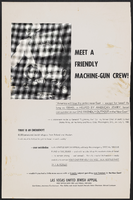
Las Vegas United Jewish Appeal "Meet A Friendly Machine-Gun Crew!" poster, 1953-1959
Date
Archival Collection
Description
Meet A Friendly Machine-Gun Crew! poster from the Las Vegas United Jewish Appeal asking for contributions to aid Jewish refugees. The text across the the front reads: "MEET A FRIENDLY MACHINE-GUN CREW! "America will lose the entire near East -- except for Israel! As long as ISRAEL is HELPED BY AMERICAN JEWRY, Israel can survive as our ONE FRIENDLY OUTPOST in the Near East!" - a statement made by General "Lightening Joe" Collins, former Chief of Staff, United States Army, at the Army and Navy Club, Washington, D.C., on July 1. 1958. TODAY IS AN EMERGENCY!! 80,000 persecuted Jewish refugees from Poland and Moslem lands must be helped to get to Israel - and quickly! Your contribution to the UNITED JEWISH APPEAL will help the emergency SPECIAL RESCUE FUND of $100,000,000 - and will help build up the newborn state of Israel - to remain strong - well-armed -- fiercely proud of its freedom - ready and able to remain YOUR ONE FRIENDLY OUTPOST IN A HOSTILE PART OF THE WORLD! -wouldn't you feel a little more secure with a friendly outpost guarding your freedom in the Near East? Las Vegas United Jewish Appeal Post Office Box 1981 Las Vegas, Nevada. Carl Cohen, chairman/Co-chairmen: Moe Dalitz and Jacob Kozloff/Nevada State Chairman: Edward Levinson"
Mixed Content
Southern Nevada Community Concerts Association Records
Identifier
Abstract
The Southern Nevada Community Concerts Association (SNCCA) Records (1939-2004) document the activities of the SNCCA and consist of meeting minutes, financial records, correspondence, promotional papers, newspaper clippings, scrapbooks, photographs, and recordings of select concerts on VHS, Betamax, and an optical disc. The SNCCA worked to bring various singers, orchestras, and ballets to the communities of Las Vegas and Southern Nevada.
Archival Collection
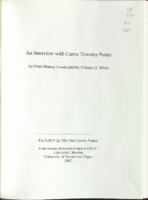
Transcript of interview with Carrie Townley Porter by Claytee D. White, February 7, 2006
Date
Archival Collection
Description
Text
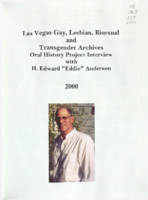
Transcript of interview with Edward "Eddie" Anderson by Dennis McBride, October 11-14, 2000
Date
Archival Collection
Description
Dennis McBride interviews Eddie Anderson (born 1946) about his role in advocating for LGBT rights, specifically his participation in the various political and social movements during previous decades. The interview begins with a discussion of Anderson’s background, including his experiences growing up in children’s homes and living with his grandparents. Anderson mentions marching with his grandparents for both workers’ and women’s rights as some of his first political involvements. Anderson also discusses his original aspirations for becoming a priest as well as his memories of meeting President John F. Kennedy during a visit to his high school when Anderson was student body president. Anderson then discusses travelling to the South, specifically in Selma, Alabama, during one summer while in high school in order to help register Black voters. Anderson then discusses his friendship with Nevada Senator Bill Raggio and his wife, and his joining of the U.S. Navy, where he met President Ri
Text

Pete Barbutti interview, September 24, 2008: transcript
Date
Archival Collection
Description
Pete Barbutti (also spelled Barbuti) played the accordion, the piano, and the trumpet. He was also a comedian and appeared numerous times on the Tonight Show starring Johnny Carson and toured with Nat King Cole. He and his family have lived in Las Vegas since 1960
Text
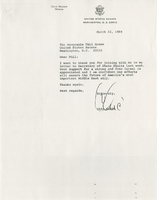

Meeting minutes for Consolidated Student Senate, University of Nevada, Las Vegas, March 17, 1981
Date
Archival Collection
Description
Text
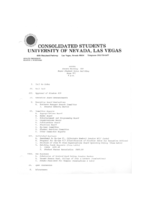
Meeting minutes for Consolidated Student Senate, University of Nevada, Las Vegas, April 21, 1981
Date
Archival Collection
Description
Text
